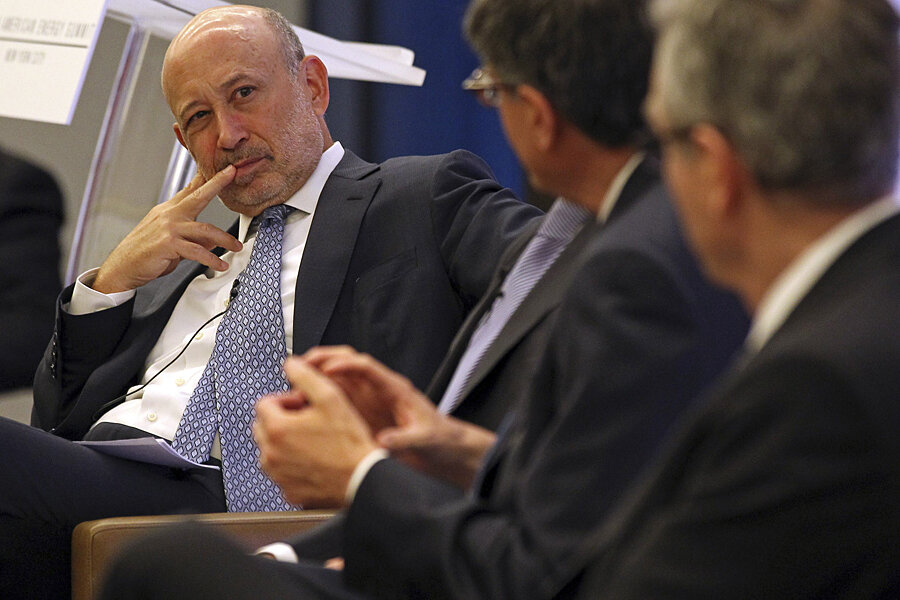To save capitalism, business leaders express concerns about middle class
Loading...
A few weeks ago I was visited in my office by the chairman of one of the country’s biggest high-tech firms who wanted to talk about the causes and consequences of widening inequality and the shrinking middle class, and what to do about it.
I asked him why he was concerned. “Because the American middle class is the core of our customer base,” he said. “If they can’t afford our products in the years ahead, we’re in deep trouble.”
I’m hearing the same refrain from a growing number of business leaders.
They see an economic recovery that’s bypassing most Americans. Median hourly and weekly pay dropped over the past year, adjusted for inflation.
Since the depths of the Great Recession in 2009, median real household income has fallen 4.4 percent, according to an analysis by Sentier Research.
These business leaders know the US economy can’t get out of first gear as long as wages are declining. And their own businesses can’t succeed over the long term without a buoyant and growing middle class.
They also recognize a second danger.
Job frustrations are fueling a backlash against trade and immigration. Any hope for immigration reform is now dead in Congress, and further trade-opening agreements are similarly moribund. Yet the economy would be even worse if America secedes into isolationism.
Lloyd Blankfein, CEO of Goldman Sachs, warned recently on “CBS This Morning” that income inequality is “destablilizing” the nation and is “responsible for the divisions in the country.” He went on to say that “too much of the GDP over the last generation has gone to too few of the people.”
Blankfein should know. He pulled in $23 million last year in salary and bonus, a 9.5 percent raise over the year before and his best payday since the Wall Street meltdown. This doesn’t make his point any less valid.
Several of business leaders are suggesting raising the minimum wage and increasing taxes on the wealthy.
Bill Gross, Chairman of Pimco, the largest bond-trading firm in the world, said this week that America needs policies that bring labor and capital back into balance, including a higher minimum wage and higher taxes on the rich.
Gross has noted that developed economies function best when income inequality is minimal.
Several months ago Gross urged his wealthy investors, who benefit the most from a capital-gains tax rate substantially lower than the tax on ordinary income, to support higher taxes on capital gains. “The era of taxing ‘capital’ at lower rates than ‘labor’ should now end,” he stated.
Similar proposals have come from billionaires Warren Buffett and Stanley Druckenmiller, founder of Duquesne Capital Management and one of the top performing hedge fund managers of the past three decades. Buffett has suggested the wealthy pay a minimum tax of 30 percent of their incomes.
The response from the denizens of the right has been predictable: If these gentlemen want to pay more taxes, there’s nothing stopping them.
Which misses the point. These business leaders are arguing for changes in the rules of the game that would make the game fairer for everyone. They acknowledge it’s now dangerously rigged in the favor of people like them.
They know the only way to save capitalism is to make it work for the majority rather than a smaller and smaller minority at the top.
In this respect they resemble the handful of business leaders in the Gilded Age who spearheaded the progressive reforms enacted in the first decade of the twentieth century, or those who joined with Franklin D. Roosevelt to create Social Security, a minimum wage, and the forty-hour workweek during the Depression.
Unfortunately, the voices of these forward-thinking business leaders are being drowned out by backward-lobbying groups like the US Chamber of Commerce that are organized to reflect the views of their lowest common denominator.
And by billionaires like Charles and David Koch, who harbor such deep-seated hatred for government they’re blind to the real dangers capitalism now faces.
Those dangers are a sinking middle class lacking the purchasing power to keep the economy going, and an American public losing faith that the current system will deliver for them and their kids.
America’s real business leaders understand unless or until the middle class regains its footing and its faith, capitalism remains vulnerable.








